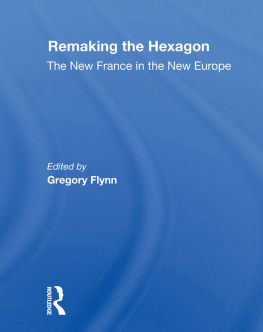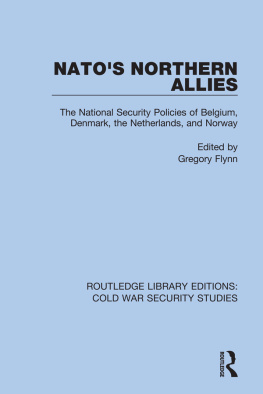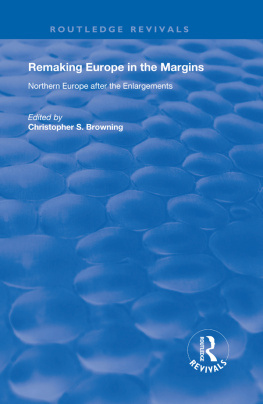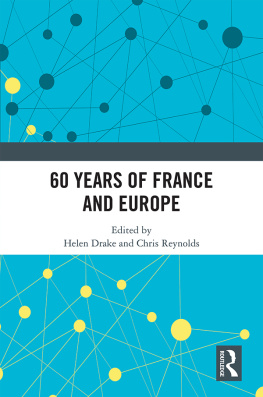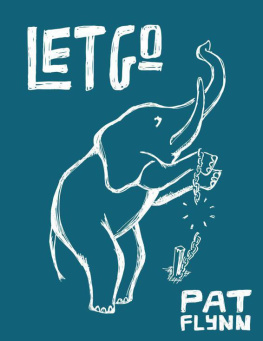Remaking the Hexagon
Remaking the Hexagon
The New France in the New Europe
Edited by
Gregory Flynn
First published 1995 by Westview Press, Inc.
Published 2019 by Routledge
52 Vanderbilt Avenue, New York, NY 10017
2 Park Square, Milton Park, Abingdon, Oxon OX14 4RN
Routledge is an imprint of the Taylor & Francis Group, an informa business
Copyright 1995 Taylor & Francis
All rights reserved. No part of this book may be reprinted or reproduced or utilised in any form or by any electronic, mechanical, or other means, now known or hereafter invented, including photocopying and recording, or in any information storage or retrieval system, without permission in writing from the publishers.
Notice:
Product or corporate names may be trademarks or registered trademarks, and are used only for identification and explanation without intent to infringe.
Library of Congress Cataloging-in-Publication Data
Remaking the Hexagon: the new France in the new Europe / Gregory Flynn, ed.
p. cm.
Includes bibliographical references and index.
ISBN 0-8133-8919-4 ISBN 0-8133-8927-5 (pbk.)
1. FranceCivilizationPhilosophy. 2. FrancePolitics and government1981- 3. National characteristics, French. 4. Europe 1992. 5. Social changeFranceHistory20th century. 6. France RelationsEurope. 7. EuropeRelationsFrance. I. Flynn, Gregory.
DC58.R36 1995
944.083'9dc20
94-46249
CIP
ISBN 13: 978-0-367-28561-6 (hbk)
Contents
, Gregory Flynn
, Jean-Nol Jeanneney
, Richard F. Kuisel
, Alain-Grard Slama
, Jacques E. Le Cacheux
, William James Adams
, David Ross Cameron
, Ezra Suleiman
, Yves Mny
, Suzanne Berger
, Frdric Bozo
, Gregory Flynn
, Stanley Hoffmann
Guide
This book has resulted from collaboration between the Center for German and European Studies in the Edmund A. Walsh School of Foreign Service, Georgetown University, and the Fondation Nationale des Sciences Politiques in Paris. Our work together exemplifies the best in academic collaboration. Special thanks are due to Alain Lancelot, the president of the fondation, and to Franoise Sauvage, the director of international programs at the fondation, for all of their support in making this project happen.
The first drafts of the book's chapters were presented at a very productive two-day conference held at Georgetown in October 1993. The authors gathered with many of the top specialists on France from both sides of the Atlantic. Numerous people were involved in making possible this conference and subsequent completion of the book manuscript. Contributions for both the conference and project were received from Air France, the Embassy of France, Mrs. John French III, the W. Averell and Pamela C. Harri man Foundation, the Anna-Maria and Stephen Kellen Foundation, the Philip Morris Companies, Inc., and Time Warner International. We are extremely grateful to them all for their generous support. Special thanks are owed to Paula Dempsey of Air France for her efforts well beyond the call of duty when an untimely strike by Air France personnel in Paris conspired to keep the conference from taking place. I also wish to thank Ambassador Jacques Andrani and his staff at the French Embassy for their logistical help, without which this conference would not have been possible.
In the end, people always make the difference in every project, and I have been especially blessed with outstanding help from my graduate student assistants during the life of this project. I have frequently convinced myself of how much they learned in the process; while this may well be true, they also gave generously of their time and energies. The greatest burden was borne by Daniel Powers, who organized the conference in October 1993 and who served as my right hand in the early phases of editing. His talents and professionalism were praised more than once by the collaborators in this volume; his care and mature judgment greatly facilitated my own work. Henry Farrell joined me during the final editing phase and several texts owe a great deal to his sharp mind and skilled pen. The privilege of working with these two fine young scholars has been all mine. I also wish to thank Joseph Mellott and Richard Wiggers who provided additional help at crucial moments. Lastly, Marlene Niefeld has overseen the preparation of the photo-ready manuscript with the kind of attention and adeptness that one can only dream of. All have made this a better piece of work and have my lasting gratitude.
Gregory Flynn
1
Remaking the Hexagon
Gregory Flynn
All of the nations of Europe have had difficulty adjusting to the dramatic changes that have transformed the continent in recent years, but none more than France. In the case of France, the changes in the European context have coincided with deep-seated structural changes in French politics and society. Europe has emerged from its division during the Cold War and new questions are being raised about the purpose and form of European integration. Together with the challenges of modern society and the demands of contemporary economic management, these new conditions are forcing a reexamination of many assumptions about how France is governed, the objectives of national policies, and ultimately what it means to be French. The result has been a national preoccupation with French identity.
At first blush, the outside observer may be forgiven for viewing all this with a certain cynical skepticism. There is nothing new about France's preoccupation with its own cohesion and its own role and image. At numerous moments throughout the last century France has been both deeply divided over political and social issues affecting the very heart of the nation's character and distressed by its decline internationally. Since World War II, France has endured not only the humiliation of defeat and the consequent deep, emotional divisions separating those who resisted from those who collaborated, but also the indignities of decolonization and the fratricide it engendered at home. Under the Fifth Republic, however, France has also witnessed a phenomenal economic, social, and political renaissance; this was accompanied by an assertiveness abroad that constantly sought to remind others as well as itself that it remained a major international force. Thus,
This book has not set for itself the task of resolving either the philosophical or the methodological issues associated with the study of French national identity. Rather the group of scholars gathered here have had another agenda: to understand better why France has seemingly had such difficulty as it seeks to chart its course into the next century. The challenge of remaking the hexagon, that is refashioning the French approach to governance and the management of international relationships in response to structural changes in society and the international system, is substantial, but on the surface at least, no more substantial than that faced by many other countries. It would certainly seem, for example, that the magnitude and difficulty of adjustment for Germany after reunification is greater than that faced by France. And yet the public proclamations of France's difficulties would seem to imply that something particular has been transpiring in this country.


